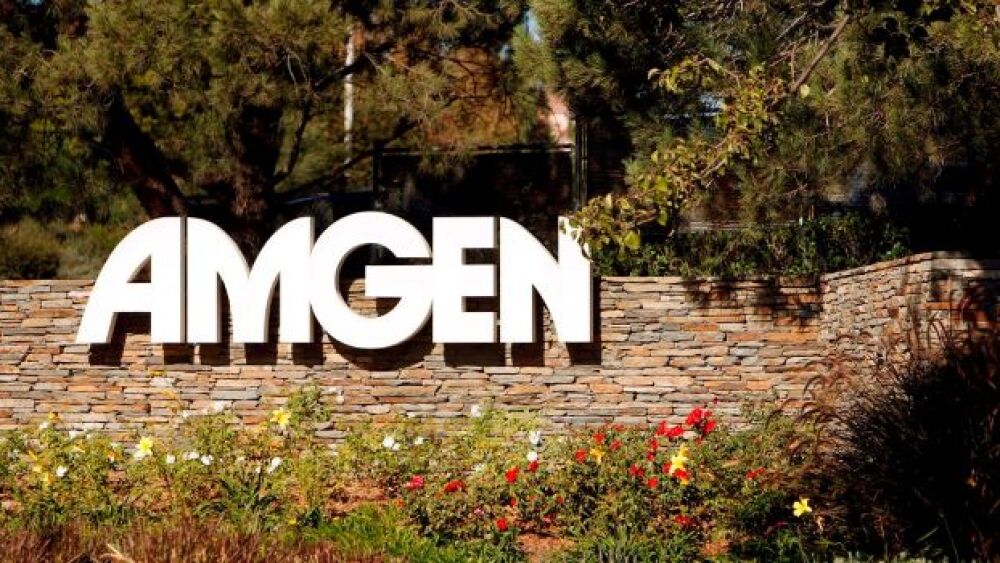Data presented at the AACR Annual Meeting over the weekend will likely lead to continued stock jumps for Amgen, Bicycle Therapeutics and BioNTech.
Al Seib / Los Angeles Times via Getty Images
Data presented at the American Association for Cancer Research (AACR) Annual Meeting over the weekend will likely lead to continued stock jumps for Amgen, Bicycle Therapeutics and BioNTech. Each of the companies ended April’s first full week with a boost in stock valuations and trade volumes.
Follow-up data from Amgen’s CodeBreaK 100 Phase 1/2 trial was presented at the meeting. The trial sought to investigate the long-term use of Lumakras (sotorasib) in patients with KRAS G12C-mutated advanced non-small cell cancer (NSCLC). The Lumakras treatment was approved by the FDA in 2021, however, long-term efficacy hadn’t yet been demonstrated.
Over the course of two years, researchers collected data from 174 patients, including an ORR of 40.7%, and a DCR of 83.7%. They measured the median duration of response at 12.3 months. Progression-free survival averaged at 6.3 months, while overall, patients survived for 12.5 months under treatment. Safety was demonstrated, as no new signals emerged from the CodeBreaK trial.
Amgen Executive Vice President of Research and Development Dr. David Reese stated his pride in the extensive approvals already granted to the therapeutic.
“With regulatory approvals in nearly 40 countries and thousands of patients treated, LUMAKRAS, the only approved KRASG12C inhibitor, is a transformative targeted therapy for the treatment of patients living with KRAS G12C-mutated NSCLC,” he said.
Bicycle Therapeutics gave an oral presentation of interim data from a Phase I/II clinical trial investigating the company’s therapeutic targeting urothelial carcinoma (UC) solid tumors, BT8009. The drug targets nectin cell adhesion molecule 4 (Nectin-4), which plays a role in cell proliferation, adhesion, and migration.
Results from the trial support the efficacy and safety of BT8009. Even in dosages as low as 5 mg/m2, participants showed preliminary responses. Overall, half of the 34 participants demonstrated a complete or partial response to BT8009. The disease control rate (DCR) was measured at 75%. Further trials will examine how BT8009 works alone and in combination with chemotherapeutic nivolumab.
Owing in part to successes at AACR and to the development of a COVID-19 therapeutic, Bicycle stock showed an uptick on the day of the presentation. The antiviral treatment uses a similar small molecule technology as all others being developed by Bicycle. The company primarily works to develop therapeutics utilizing the proprietary synthetic technology that is referred to as Bicycles, which can be adapted to suit targets.
BioNTech’s CAR-T cell therapeutic, BNT211, was showcased at the AACR after showing Phase I efficacy when stimulated by a combination with mRNA vaccine technology. The hypothesis is that, when paired with antigen-encoding nanoparticulates from mRNA, efficacy will be higher or longer-lasting. BioNTech named the mRNA vaccine CARVac.
The study, conducted at the Netherlands Cancer Institute (NCI), theorized that BNT211 and CARVac paired are effective in targeting Claudin-6, seen on solid tumors. Five patients in the trial showed tumor shrinkage, while the overall objective response rate (ORR) was 43%. Long-term, deeper analysis will be required before confidence can be achieved.
The company hit a roadblock when the COVID-19 pandemic hit and shifted the focus of research efforts, thus delaying the trial four years before finally getting started in 2020. BioNTech’s combination therapy marks the first that has successfully reached human trials.
Featured Jobs on BioSpace





